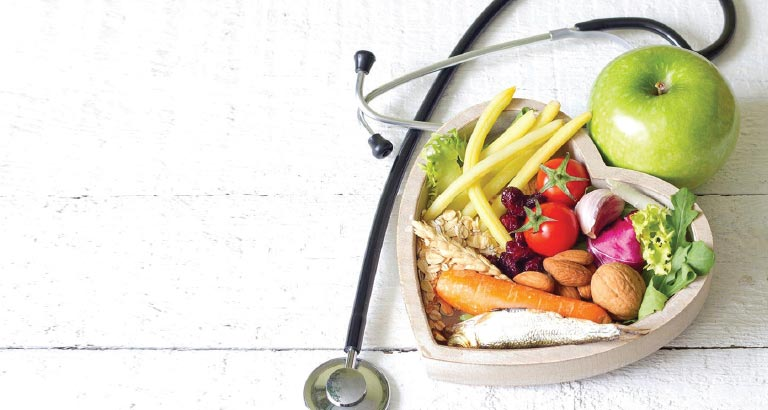
Royal Bahrain Hospital’s nutritionist, Danah Quintana, outlines practical ways to nurture the body and soul during the Holy Month.
The food choices that we make during Ramadan, the month of mercy and forgiveness, have a direct impact on our physical and spiritual wellbeing. Overeating has long been frowned upon in Islam as it is thought to increase materialistic appetite and cause sluggishness, thereby ‘dulling’ the soul, hampering spiritual growth and increasing bodily ailments. So, while we discuss the various benefits of fasting, we should also consider giving attention to nutrition during this month. A diet that is well-balanced will keep a person healthy and active during Ramadan. It should be simple and not differ too much from one’s everyday diet. It should comprise all the major food groups, such as fruits and vegetables, whole grains, lean meat, fish and other protein alternatives, milk and milk products, healthy oils and fats, and water.
What happens to the body during fasting?
Our body uses its carbohydrate stores in the liver and muscles, as well as fats, to provide energy once all the calories from the foods eaten the night before have been consumed during fasting. The kidneys, during fasting, conserve as much water as possible by reducing the amount lost in urine. But then, some water is lost when you go to the toilet; through your skin; and when you breathe and perspire, especially when it’s warm.
 Sometimes mild dehydration can be experienced, which manifests as headaches, tiredness and difficulty concentrating. However, studies have suggested that this is not harmful to health, provided that enough fluids are consumed after breaking the fast to replace those lost during the day. However, if you are unable to stand up due to dizziness, or you are disoriented, you should immediately drink regular, moderate quantities of water (ideally with added sugar and salt), a sugary drink or a rehydration solution. If someone has fainted due to dehydration, their legs should be raised above the level of the head and, on regaining consciousness, they should be made to urgently rehydrate as outlined above. For regular consumers of caffeinated drinks such as tea and coffee, the lack of caffeine during the fast may initially cause headaches and tiredness. However, this will ease over the course of Ramadan as the body adjusts to going without caffeine during the day. Having not eaten for a long period, you may find it helpful to eat slowly when breaking the fast and to start with plenty of liquids and low-fat, fluid-rich foods.
Sometimes mild dehydration can be experienced, which manifests as headaches, tiredness and difficulty concentrating. However, studies have suggested that this is not harmful to health, provided that enough fluids are consumed after breaking the fast to replace those lost during the day. However, if you are unable to stand up due to dizziness, or you are disoriented, you should immediately drink regular, moderate quantities of water (ideally with added sugar and salt), a sugary drink or a rehydration solution. If someone has fainted due to dehydration, their legs should be raised above the level of the head and, on regaining consciousness, they should be made to urgently rehydrate as outlined above. For regular consumers of caffeinated drinks such as tea and coffee, the lack of caffeine during the fast may initially cause headaches and tiredness. However, this will ease over the course of Ramadan as the body adjusts to going without caffeine during the day. Having not eaten for a long period, you may find it helpful to eat slowly when breaking the fast and to start with plenty of liquids and low-fat, fluid-rich foods.
What’s the best thing to eat to sustain long hours of fasting?
Unprocessed, complex carbohydrates and fibre-rich foods including whole grains, barley, oats, wheat berries, brown rice, beans/lentils, nuts/seeds and almost all fruits and vegetables are foods that will help release energy slowly during the long hours of fasting.
What to avoid in Ramadan?
Items such as cakes, biscuits, chocolates and sweets are heavily processed and quickly digested foods which are not in their original form. They are mostly made of refined carbohydrates mixed with loads of hidden sugar, fat and sodium. It may also be worth reducing your caffeine intake from tea, coffee and sodas; for caffeine is a diuretic and stimulates faster water loss through urination.
Suhoor, the pre-dawn meal, should be as wholesome, moderate and filling as possible to provide enough energy for many hours. It is therefore particularly important to include slowly-digesting foods at this meal.
Iftar, the meal which breaks the day’s fast, traditionally includes dates, to provide a refreshing burst of much-needed energy. Fruit juices will have a similar, revitalising effect. The meal should remain a meal and not become a feast! It’s important to focus on eating healthy and nutritious food for this meal.
What and how much we eat directly affects our health, especially during the Holy Month, and refraining from unhealthy food can help improve self-discipline and restraint if done appropriately. Ramadan is an opportunity to make healthy lifestyle choices and give up some of our bad habits. Being mindful of how you fast and how you break your fast can help to improve your overall health – both physically and mentally.
RULES TO REMEMBER:
1. Break your fast with dates and water and eat after prayer.
2. Add soup and vegetable salads in your meal plan.
3. Stay away from fried (oily) and fatty food and substitute frying with baking or grilling.
4. Avoid eating sweets every day during Ramadan and restrict them to special occasions (such as dining out or inviting guests to an Iftar meal).
5. Drink eight to 12 glasses of water during non-fasting hours.



